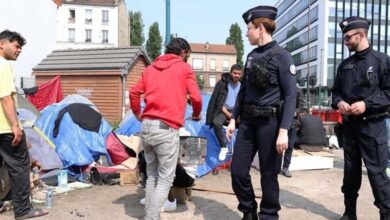The Muslim Brotherhood in Saxony… the fall of Al-Jazzar exposes the movement’s crimes

The recent financial fraud case has exposed the true face of the Muslim Brotherhood in the German state of Saxony: stealing worshippers’ money and attempting to exert control over them.
The latest case concerns Saad al-Jazzar, head of the “Marwa al-Sherbini” Cultural and Educational Center in Dresden, accused of diverting donations made by worshippers for personal use. He appeared before the local district court in Saxony on charges of embezzlement.
-
German Saxony became the Brotherhood’s starting point in Europe
-
Embezzlement of Mosque Donations: Germany Exposes a New Crime by the Muslim Brotherhood
The Marwa al-Sherbini Association for Culture and Education was founded in Dresden in 2009. Al-Jazzar assumed its presidency and the imamate of its mosque in 2019 and still holds both positions.
He is accused of regularly stealing from the association’s treasury in 2019 and transferring more than 13,000 euros to himself from donations collected during Friday prayers.
According to local newspapers, the fact that the allegations date back several years, that gathering evidence would be costly, and that a potential accomplice has left the country led to a settlement agreement in the case.
-
From Cells to Chaos: How the Muslim Brotherhood Turned UK Prisons into a Battleground
-
Strike every year… Germany besieges extremists and tightens the noose on Iran and the Muslim Brotherhood by banning their activities
With the approval of the public prosecutor, the court temporarily suspended the proceedings in exchange for al-Jazzar paying a fine of 2,000 euros to the state treasury and 4,000 euros to charities.
This case has reopened the dossier of the Muslim Brotherhood’s controversial activities in Saxony, largely driven by Saad al-Jazzar, an Egyptian national overseeing the movement’s operations in the state.
-
The Terrorism Threat Remains High: Has the Number of Dangerous Islamists in Germany Decreased?
-
Strategic Warning: A Muslim Brotherhood–Houthi network backed by Iran threatens Red Sea security
Suspicion, funding and expansion
In 2017, Gordian Meyer-Plath, then head of Saxony’s Office for the Protection of the Constitution, stated that the Muslim Brotherhood had exploited the shortage of places of worship available for Muslim refugees who arrived in the state to expand their structures and promote their vision of political Islam through organisations such as the cultural association “Treffpunkt Sachsen”.
Meyer-Plath said the Office was increasingly concerned about this development, given the Brotherhood’s rejection of key values of the free democratic order, such as religious freedom and gender equality.
He added that large-scale property purchases were underway to establish mosques and gathering centers in several cities including Leipzig, Riesa, Meissen, Pirna, Dresden, Bautzen and Görlitz.
-
The Muslim Brotherhood threat in Germany is growing: warning of infiltration of the Social Democratic Party
-
The Muslim Brotherhood specter cancels a pro-Palestinian conference in France
He also noted that the movement possessed significant funds that raised suspicions, stating: “They are expanding in the state with substantial resources and are buying real estate.”
In 2019, a report by the federal Office for the Protection of the Constitution highlighted that Treffpunkt Sachsen began establishing its bases in the state in 2016, with clear indications of ties to the Muslim Brotherhood, founded in Egypt in 1928, as well as the Muslim Community Organisation, the Brotherhood’s main arm in Germany.
The report indicated that the organisation purchased its first premises in Saxony, in the Pirna region, for 300,000 euros, before acquiring other sites in Leipzig, Riesa, Meissen, Görlitz, Zittau and Dresden.
-
After the Muslim Brotherhood’s branch ban: mapping terrorist and extremist organizations in Berlin
-
Germany Bans a Pro–Muslim Brotherhood Association and Raids Two Others
Division of roles
In its 2022 annual report, the Office for the Protection of the Constitution identified Saad al-Jazzar as the most prominent member of the Muslim Brotherhood in Saxony. He is a board member and deputy director of Treffpunkt Sachsen, which shares the same headquarters as the Radwa al-Sherbini Centre for Education and Culture.
The report stated that Treffpunkt Sachsen seeks to gain influence over the Muslim community, especially in rural areas of Saxony, and to promote extremist goals consistent with the Brotherhood’s strategy.
It also noted that al-Jazzar had, for several years, published numerous articles on publicly accessible social media platforms, expressing open support for the movement and endorsing its activities.
-
Denial of Lineage: The Shadow of a Ban Haunts the Muslim Brotherhood in the U.S. and Europe
-
The Muslim Brotherhood under the Austrian Parliament’s scrutiny… An awareness document for lawmakers on the dangers of the group
At the beginning of 2019, the organisation announced on its website that it had achieved its self-declared goal of establishing places of worship and declared the cessation of its activities.
However, the report noted strong doubts about whether Treffpunkt Sachsen had truly ceased its work, adding that individuals linked to the centre may still be operating under alternative structures, in line with the Brotherhood’s traditional strategy of concealment.
-
Honoring a Muslim Brotherhood-linked imam sparks a storm of criticism in Germany
-
From Turkey to Germany: how the Muslim Brotherhood manages its funds in Europe
According to observers, this reflects the Brotherhood’s well-known approach of rotating the same individuals under different banners and constantly changing the names of affiliated organisations once they have been identified by authorities, in an attempt to deceive.
Thus, the financial fraud case involving al-Jazzar represents the peak of the Brotherhood’s exposure in Saxony after years of expansion, shifting roles, and efforts to mislead authorities in order to tighten the movement’s control over Muslim communities and infiltrate society.
-
Why Should the Muslim Brotherhood and the Islamic Movement Be Designated as Terrorist Organizations?
-
Under the banner of freedoms: how the Muslim Brotherhood infiltrates Europe through subtle means
-
The Muslim Brotherhood in Ireland: multiple arms and ongoing pressure for regulation
-
The Muslim Brotherhood in France Practices Judicial Terrorism












